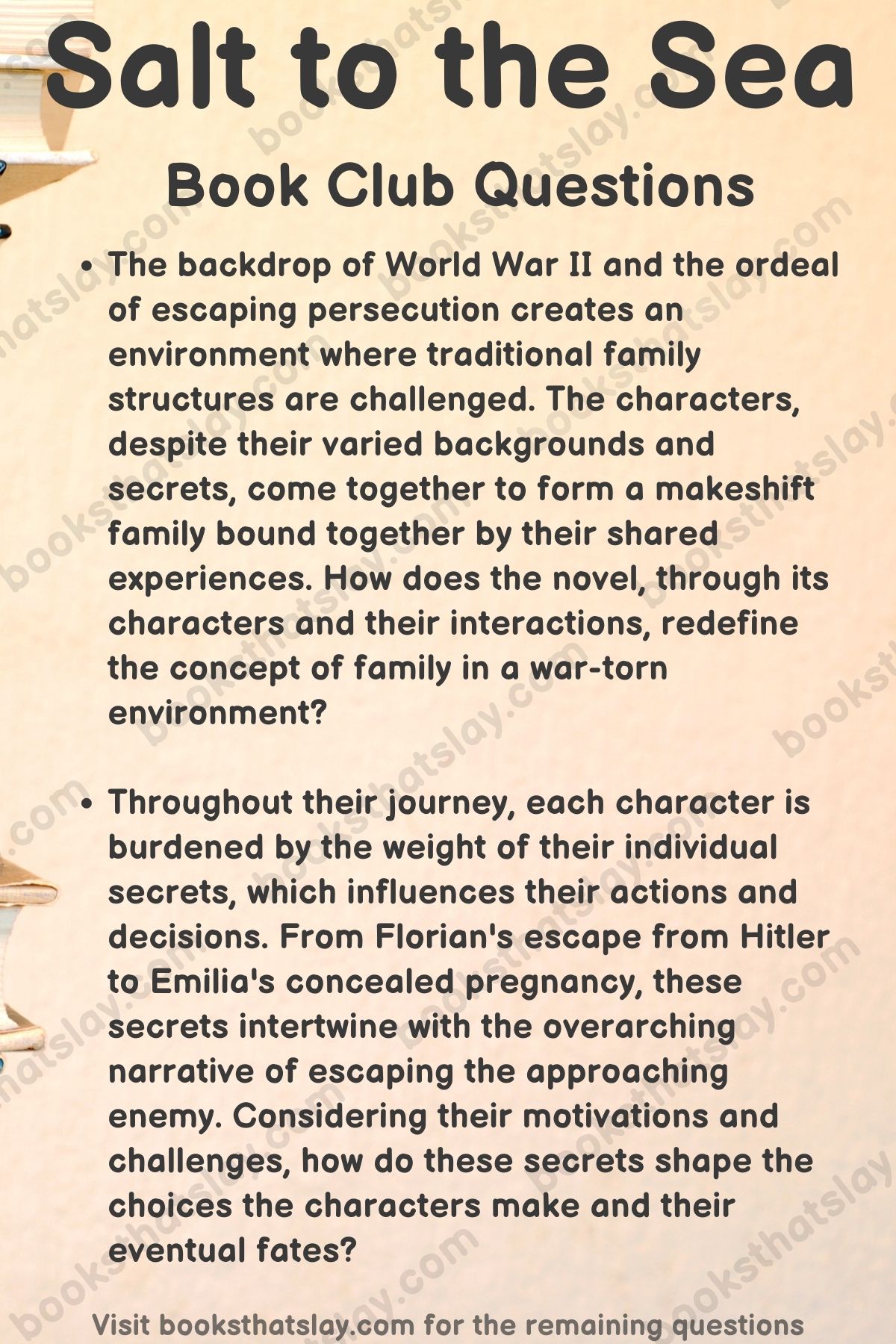10 Salt to the Sea Book Club Questions For Discussion
Ruta Sepetys’ novel, “Salt to the Sea”, doesn’t merely recount the harrowing journey of four young souls amidst the ravages of World War II but also delves into profound and universal themes that resonate beyond the confines of its historical setting.
From the nuanced exploration of makeshift families formed in chaos, the burden of secrets, to the tumultuous intersection of youth and war, the book offers a rich lesson of human resilience, sacrifice, and the undying quest for truth.
As we embark on this blog post, we’ll be diving deep into some meticulously crafted book club discussion questions for Salt to the Sea that seek to unravel the layered complexities of the narrative in a much broader sense.
Whether you’ve just turned the last page or are revisiting the tale, these questions promise to enrich your understanding and appreciation of Sepetys’ masterpiece.
Let’s begin.

Salt to the Sea Book Club Questions
- The backdrop of World War II and the ordeal of escaping persecution creates an environment where traditional family structures are challenged. The characters, despite their varied backgrounds and secrets, come together to form a makeshift family bound together by their shared experiences.
How does the novel, through its characters and their interactions, redefine the concept of family in a war-torn environment? - Emilia’s character in “Salt to the Sea” bears the heavy weight of trauma, from losing her family to enduring the horrors of assault. Despite her past, she displays remarkable resilience and even serves as the “glue” that binds the group.
How does Emilia’s representation as both a symbol of lost innocence and a beacon of hope speak to the broader themes of resilience and survival against all odds during wartime? - Throughout their journey, each character is burdened by the weight of their individual secrets, which influences their actions and decisions. From Florian’s escape from Hitler to Emilia’s concealed pregnancy, these secrets intertwine with the overarching narrative of escaping the approaching enemy.
Considering their motivations and challenges, how do these secrets shape the choices the characters make and their eventual fates? - The novel presents a striking contrast between the characters of Florian and Alfred, with Florian often being the voice of reason and moral compass while Alfred remains a stark representation of blind adherence to dangerous ideologies. Alfred’s delusional portrayal as a self-proclaimed Nazi hero ultimately leads to his downfall.
Considering Alfred’s tragic end, how does the book explore the dangers of fanaticism and the effects of propaganda on the young minds of a generation? - “Salt to the Sea” positions its young protagonists in the epicenter of one of the world’s most devastating wars. Their journey from childhood to adulthood is complicated by the chaos and trauma surrounding them, forcing them to grapple with immense loss, newfound responsibilities, and moral dilemmas.
How does the juxtaposition of the protagonists’ youth with the harsh realities of war influence their individual coming-of-age narratives? - Ingrid’s character, though she meets an early end, stands as a testament to strength and resilience. Her unique abilities, heightened due to her blindness, demonstrate that power and leadership can stem from sources considered unconventional or even weak by societal standards.
How does Ingrid’s role in the story challenge preconceived notions of strength, and in what ways does her character force readers to redefine societal concepts of disability? - Emilia’s act of saving her newborn and others when the ship is struck showcases immense bravery and sacrifice. The story provides numerous instances where characters demonstrate both selfishness and selflessness, oftentimes in moments of extreme duress.
In what ways does the novel challenge or support traditional notions of heroism, and how do these acts of sacrifice or betrayal impact the broader narrative? - Eva’s forthrightness and towering physical stature set her apart from the other characters. Despite the oppressive environment of the war, her candid nature and unapologetic presence serve as a reminder that authenticity is a form of rebellion.
In what ways does Eva’s character, particularly her refusal to be suppressed, underscore the idea that personal truth and authenticity can serve as powerful counter-narratives to oppressive regimes? - The novel places emphasis on truth-telling as a path to overcome the past and find redemption. From Joana’s guilt as a “murderer” to Alfred’s embellished accounts of his importance, the narrative dwells on the conflict between truth and deception.
How does confronting or revealing the truth change the trajectory of the characters’ lives, and what commentary might the author be offering on the power of honesty during times of conflict? - The Shoe Poet, with his profound insights drawn from seemingly mundane observations of shoes, embodies wisdom and an alternate perspective. He teaches the group, and by extension, the readers, to find beauty, connection, and depth in the overlooked aspects of life.
Given his profound impact on the group and eventual sacrifice, how does the Shoe Poet’s metaphorical connection between shoes and human experience deepen our understanding of human nature, especially during dire circumstances?
Read our discussion questions for other books